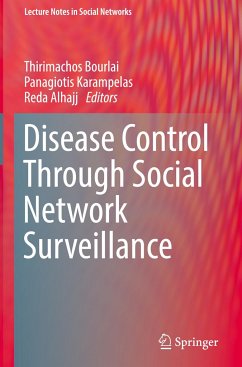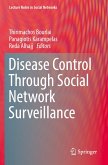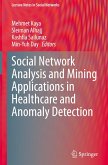Disease Control Through Social Network Surveillance
Herausgegeben:Bourlai, Thirimachos; Karampelas, Panagiotis; Alhajj, Reda
Disease Control Through Social Network Surveillance
Herausgegeben:Bourlai, Thirimachos; Karampelas, Panagiotis; Alhajj, Reda
- Gebundenes Buch
- Merkliste
- Auf die Merkliste
- Bewerten Bewerten
- Teilen
- Produkt teilen
- Produkterinnerung
- Produkterinnerung
This book examines modern paradigms of disease control based on social network surveillance applications, including electronic sentinel surveillance and wireless application-based surveillance science. It also highlights topics that integrate statistical and epidemiological sciences with surveillance practice and, in order to reflect the evolution of social networking practices, discusses topics concerning the challenges for surveillance theory and practice. In turn, the book goes a step further by providing insights on how we need to analyse epidemiological trends by following best practices…mehr
Andere Kunden interessierten sich auch für
![Disease Control Through Social Network Surveillance Disease Control Through Social Network Surveillance]() Disease Control Through Social Network Surveillance89,99 €
Disease Control Through Social Network Surveillance89,99 €![Social Network Analysis and Mining Applications in Healthcare and Anomaly Detection Social Network Analysis and Mining Applications in Healthcare and Anomaly Detection]() Social Network Analysis and Mining Applications in Healthcare and Anomaly Detection113,99 €
Social Network Analysis and Mining Applications in Healthcare and Anomaly Detection113,99 €![Disinformation, Misinformation, and Fake News in Social Media Disinformation, Misinformation, and Fake News in Social Media]() Disinformation, Misinformation, and Fake News in Social Media137,99 €
Disinformation, Misinformation, and Fake News in Social Media137,99 €![Surveillance, Prevention, and Control of Infectious Diseases Surveillance, Prevention, and Control of Infectious Diseases]() Surveillance, Prevention, and Control of Infectious Diseases121,99 €
Surveillance, Prevention, and Control of Infectious Diseases121,99 €![Disinformation, Misinformation, and Fake News in Social Media Disinformation, Misinformation, and Fake News in Social Media]() Disinformation, Misinformation, and Fake News in Social Media137,99 €
Disinformation, Misinformation, and Fake News in Social Media137,99 €![Trends in Social Network Analysis Trends in Social Network Analysis]() Trends in Social Network Analysis97,99 €
Trends in Social Network Analysis97,99 €![Social Network Analysis in Predictive Policing Social Network Analysis in Predictive Policing]() Mohammad A. TayebiSocial Network Analysis in Predictive Policing81,99 €
Mohammad A. TayebiSocial Network Analysis in Predictive Policing81,99 €-
-
-
This book examines modern paradigms of disease control based on social network surveillance applications, including electronic sentinel surveillance and wireless application-based surveillance science. It also highlights topics that integrate statistical and epidemiological sciences with surveillance practice and, in order to reflect the evolution of social networking practices, discusses topics concerning the challenges for surveillance theory and practice.
In turn, the book goes a step further by providing insights on how we need to analyse epidemiological trends by following best practices on distinguishing useful information from noise, namely fake news, false reporting of disease incidents and events, etc. At the same time, we need to be able to protect health-focused applications and communication tools via cybersecurity technologies and to ensure that anonymity of reporting and privacy are preserved. In closing, the book discusses the role and impact of social media on disease surveillance, as well as the current role of communities in infectious disease surveillance and control.
In turn, the book goes a step further by providing insights on how we need to analyse epidemiological trends by following best practices on distinguishing useful information from noise, namely fake news, false reporting of disease incidents and events, etc. At the same time, we need to be able to protect health-focused applications and communication tools via cybersecurity technologies and to ensure that anonymity of reporting and privacy are preserved. In closing, the book discusses the role and impact of social media on disease surveillance, as well as the current role of communities in infectious disease surveillance and control.
Produktdetails
- Produktdetails
- Lecture Notes in Social Networks
- Verlag: Springer / Springer International Publishing / Springer, Berlin
- Artikelnr. des Verlages: 978-3-031-07868-2
- 1st edition 2022
- Seitenzahl: 244
- Erscheinungstermin: 7. September 2022
- Englisch
- Abmessung: 241mm x 160mm x 18mm
- Gewicht: 580g
- ISBN-13: 9783031078682
- ISBN-10: 3031078683
- Artikelnr.: 63985832
- Herstellerkennzeichnung Die Herstellerinformationen sind derzeit nicht verfügbar.
- Lecture Notes in Social Networks
- Verlag: Springer / Springer International Publishing / Springer, Berlin
- Artikelnr. des Verlages: 978-3-031-07868-2
- 1st edition 2022
- Seitenzahl: 244
- Erscheinungstermin: 7. September 2022
- Englisch
- Abmessung: 241mm x 160mm x 18mm
- Gewicht: 580g
- ISBN-13: 9783031078682
- ISBN-10: 3031078683
- Artikelnr.: 63985832
- Herstellerkennzeichnung Die Herstellerinformationen sind derzeit nicht verfügbar.
Thirimachos Bourlai is an associate professor in the School of Electrical and Computer Engineering and an adjunct faculty at the Institute for Cybersecurity and Privacy, both at the University of Georgia; he is also an adjunct faculty at WVU in CSEE, School of Medicine, Forensics, and Chemical Engineering. He is the founder and director of the Multi-Spectral Imagery Lab (milab.uga.edu), a Springer Nature Series Editor of the Advanced Sciences and Technologies for Security Applications, a member of the board of directors at the Document Security Alliance, the VP of Education at the IEEE Biometrics Council, and a member of the Academic Research and Innovation Expert Group at the Biometrics Institute. He has published four books with Springer Nature, "Face Recognition Across the Imaging Spectrum", 2016, "Surveillance in Action", 2018, "Securing Social Identity in Mobile Platforms", 2020, and now the "Disease Control Through Social Network Surveillance", 2022. He has various patents, journals, and conference publications. Panagiotis Karampelas holds a Ph.D. in Electronic Engineering from the University of Kent at Canterbury, UK and a Master of Science degree from the Department of Informatics, Kapodistrian University of Athens with specialization in "High Performance Algorithms". He also holds a Bachelor degree in Mathematics from the same University majoring in Applied Mathematics. Currently, he is with the Department of Informatics and Computers, at the Hellenic Air Force Academy teaching courses to pilots and engineers participating at the same time in a number of internationalization activities on behalf of his institution. He is the author of the book "Techniques and Tools for Designing an Online Social Network Platform" published in Lecture Notes in Social Networks (2013) and editor in a number of books such as "Electricity Distribution - Intelligent Solutions for Electricity Transmission and Distribution Networks" in the BookSeries Energy Systems (2016), Surveillance in Action - Technologies for Civilian, Military and Cyber Surveillance" (2018) and Securing Social Identity in Mobile Platforms: Technologies for Security, Privacy and Identity Management" (2020) in the Book Series Advanced Sciences and Technologies for Security Applications and "From Security to Community Detection in Social Networking Platforms" (2019) in the Book Series Lecture Notes in Social Networks. He is also a contributor to the Encyclopedia of Social Network Analysis and Mining. He serves as a Series Editor in the Book Series Advanced Sciences and Technologies for Security Applications and as an Associate Editor in the Social Network Analysis and Mining journal. He also serves as program committee member in a large number of scientific journals and international conferences in his fields of interests. Finally, he participates in the Organizing Committee of the IEEE/ACM International Conference on Advances in Social Networks Analysisand Mining (ASONAM). Reda Alhajj is a tenured professor in the Department of Computer Science at the University of Calgary, Alberta, Canada. He is also affiliated with Medipol University, Istanbul, Turkey, and University of Southern Denmark, Odense, Denmark. He published over 500 papers in refereed international journals, conferences and edited books. He served on the program committee of several international conferences. He is founding editor in chief of the Springer premier journal "Social Networks Analysis and Mining", founding editor-in-chief of Springer Series "Lecture Notes on Social Networks", founding editor-in-chief of Springer journal "Network Modeling Analysis in Health Informatics and Bioinformatics", founding co-editor-in-chief of Springer "Encyclopedia on Social Networks Analysis and Mining" (ranked top 3rd in most downloaded sources in computer science in 2018), founding steering chair of the flagship conference "IEEE/ACM International Conference on Advances in Social Network Analysis and Mining", and three accompanying symposiums FAB (for big data analysis), FOSINT-SI (for homeland security and intelligence services) and HI-BI-BI (for health informatics and bioinformatics). He is member of the editorial board of the Journal of Information Assurance and Security, Journal of Data Mining and Bioinformatics, Journal of Data Mining, Modeling and Management; he has been guest editor of a number of special issues and edited a number of conference proceedings. Dr. Alhajj's primary work and research interests focus on various aspects of data science and big data with emphasis on areas like: (1) scalable techniques and structures for data management and mining, (2) social network analysis with applications in computational biology and bioinformatics, homeland security, disaster management, etc., (3) sequence analysis with emphasis on domains like financial, weather, traffic, energy, etc., (4) XML, schema integration and re-engineering. He currently leads a large research group of PhD and MSc candidates. He received best graduate supervision award and community service award at the University of Calgary. He recently mentored a number of successful teams, including SANO who ranked first in the Microsoft Imagine Cup Competition in Canada and received KFC Innovation Award in the World Finals held in Russia, TRAK who ranked in the top 15 teams in the open data analysis competition in Canada, Go2There who ranked first in the Imagine Camp competition organized by Microsoft Canada, Funiverse who ranked first in Microsoft Imagine Cup Competition in Canada.
Chapter 1. Analysis of public perceptions towards the COVID-19 vaccination drive: A case study of Tweets with Machine Learning classifiers (Kaushal Kumar).- Chapter 2. Spreader-centric Fake News Mitigation framework based on Epidemiology (Bhavtosh Rath).- Chapter 3. Understanding How Readers Determine the Legitimacy of Online Medical News Articles in the Era of Fake News (Srihaasa Pidikiti).- Chapter 4. Trends, Politics, Sentiments, and Misinformation: Understanding People's Reactions to COVID-19 During its Early Stages (Omar Abdel).- Chapter 5. Citation Graph Analysis and Alignment between Citation Adjacency and Themes or Topics of Publications in the Area of Disease Control through Social Network Surveillance (Moses Boudourides).- Chapter 6. Privacy in Online Social Networks: A Systematic Mapping Study and a Classification Framework (Sarah Bouraga).- Chapter 7. Beyond Influence Maximization: Volume Maximization in Social Networks (Abhinav Choudhury).- Chapter 8. Concerns of IndianPopulation on Covid-19 Vaccine Shortage amidst second wave infection rate spikes: A Social Media Opinion Analysis (Remya Lathabhavan).- Chapter 9. Effects of Face Masks on the performance of Modern Face Detectors (Victor Philippe).- Chapter 10. Multispectral Face Mask Compliance Classification During a Pandemic (Jacob Rose).- Chapter 11. On the Effectiveness of Periocular-Based Human Authentication when Wearing Face Masks to Slow the Spread of COVID-19 (Ananya Zabin).
Chapter 1. Analysis of public perceptions towards the COVID-19 vaccination drive: A case study of Tweets with Machine Learning classifiers (Kaushal Kumar).- Chapter 2. Spreader-centric Fake News Mitigation framework based on Epidemiology (Bhavtosh Rath).- Chapter 3. Understanding How Readers Determine the Legitimacy of Online Medical News Articles in the Era of Fake News (Srihaasa Pidikiti).- Chapter 4. Trends, Politics, Sentiments, and Misinformation: Understanding People's Reactions to COVID-19 During its Early Stages (Omar Abdel).- Chapter 5. Citation Graph Analysis and Alignment between Citation Adjacency and Themes or Topics of Publications in the Area of Disease Control through Social Network Surveillance (Moses Boudourides).- Chapter 6. Privacy in Online Social Networks: A Systematic Mapping Study and a Classification Framework (Sarah Bouraga).- Chapter 7. Beyond Influence Maximization: Volume Maximization in Social Networks (Abhinav Choudhury).- Chapter 8. Concerns of IndianPopulation on Covid-19 Vaccine Shortage amidst second wave infection rate spikes: A Social Media Opinion Analysis (Remya Lathabhavan).- Chapter 9. Effects of Face Masks on the performance of Modern Face Detectors (Victor Philippe).- Chapter 10. Multispectral Face Mask Compliance Classification During a Pandemic (Jacob Rose).- Chapter 11. On the Effectiveness of Periocular-Based Human Authentication when Wearing Face Masks to Slow the Spread of COVID-19 (Ananya Zabin).








